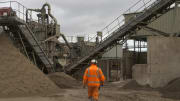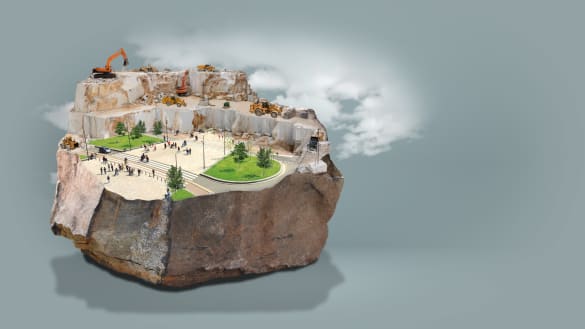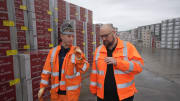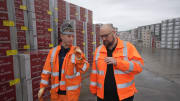Marshalls has signalled its ongoing and long term commitment to children's rights in India and those of the wider quarrying community in its recently announced partnership with UNICEF UK.
Chris Harrop, Marshalls group marketing director responsible for sustainability, says, "UNICEF UK is highly regarded as a leading authority for innovative business partnerships which create positive change for young people. We have come together to combat the exploitation of children in the stone quarrying sector of northern India and this three-year partnership is part of Marshalls long term commitment to tackling child labour in the stone quarries of the country’s Rajasthan state."
Harrop went on to say that Marshalls is raising funds in aid of UNICEF-backed projects helping to transform children’s lives for the better. The partnership is expected to benefit 10,000 children in 50 villages located in the Kota district of the country’s Rajasthan state. These are stone quarrying communities where UNICEF is working to bolster child protection systems and safeguard the rights of vulnerable children. It is also supporting the development of education projects and a health referral system to address the health needs and problems of children in these areas.
India is one of the world’s largest raw stone producers, accounting for more than 11 per cent of the world's total exports and more than 27% of stones mined worldwide (1). Every year approximately 280,000 tonnes of Indian sandstone is shipped to the UK, according to the Ethical Trading Initiative (2). This material is often used to decorate driveways and patios.
Sadly, children exploited as cheap labour, have often been associated with the production of this luxury paving product.
UNICEF estimates that approximately 20% of India's mine workers are children. Many toil strenuously for more than 10 hours per day in dangerous and filthy conditions with some earning as little as £1.50 (150 rupees) a day. Child miners face a variety of risks in India’s quarries, which are dangerous and affect their health. Exposure to fine dust puts them at risk of contracting chronic respiratory illnesses. Some may carry slabs of rocks far too heavy for their body sizes on a daily basis. Some also run the risk of a serious injury caused by explosives detonated in quarries.
Since 2006, Marshalls has worked hard to raise consumer and industry awareness of child labour in India’s stone quarrying sector. As a United Nation's Global Compact signatory Marshalls publically disclosed the active steps it has taken to ensure that there is no child labour in its own supply chain.
“Child labour is a persistent, unacceptable and complex global issue”, says Harrop. “Despite evidence to the contrary, many within the stone sector deny that child labour is an issue. I've seen for myself children, some as young as five or six, working in dangerous and terrifying conditions in some quarries. As part of the partnership, UNICEF is undertaking much needed independent research across the region to assess and identify the extent of the problem. Research findings will be published in conjunction with the Indian Government during 2015. I am proud that Marshalls is supporting this important research and eagerly await the findings. The ongoing partnership will see us supporting UNICEF in terms of the implementation of recommendations and appropriate interventions and projects."
Marshalls has a longstanding relationship with the quarrying region of Rajasthan and sees this partnership as part of its ongoing commitment to improving standards for children, supporting quarrying communities and to raising industry standards.
The company is one of the first to embed children’s rights in its business practices and to ensure its sandstone products are ethically sourced and produced. This includes signing up to the Children's Rights & Business Principles (4) the first comprehensive set of principles created as a guide on actions companies can take to support children’s rights.
UNICEF has been a leading international influence on drives geared towards encouraging corporations to address negative business impacts on children whilst promoting positive action on child rights. It regards Marshalls as a company that is highly committed to embedding Child Rights and Business Principles in its work.
David Bull, UNICEF UK’s Executive Director said: “We know the appalling reality for too many children in Rajasthan is that they are spending their days labouring in stone quarries instead of playing, learning and living the life that a child should. Funds raised through our partnership with Marshalls will help transform the lives of children in India’s poorest stone quarrying communities.”
Sources:
(1)
www.indianindustry.com/trade-information/indian-stone-industry.htm
(2)
/www.ethicaltrade.org/in-action/programmes/sandstone-rajasthan-india
(3)
www.whydev.org/mining-for-rights-child-labour-in-india/
For more information on UNICEF’s partnership with Marshalls visit:
UNICEF UK
For more information about Marshalls' sustainability work visit:
Marshalls' Sustainability Webpage
































































































